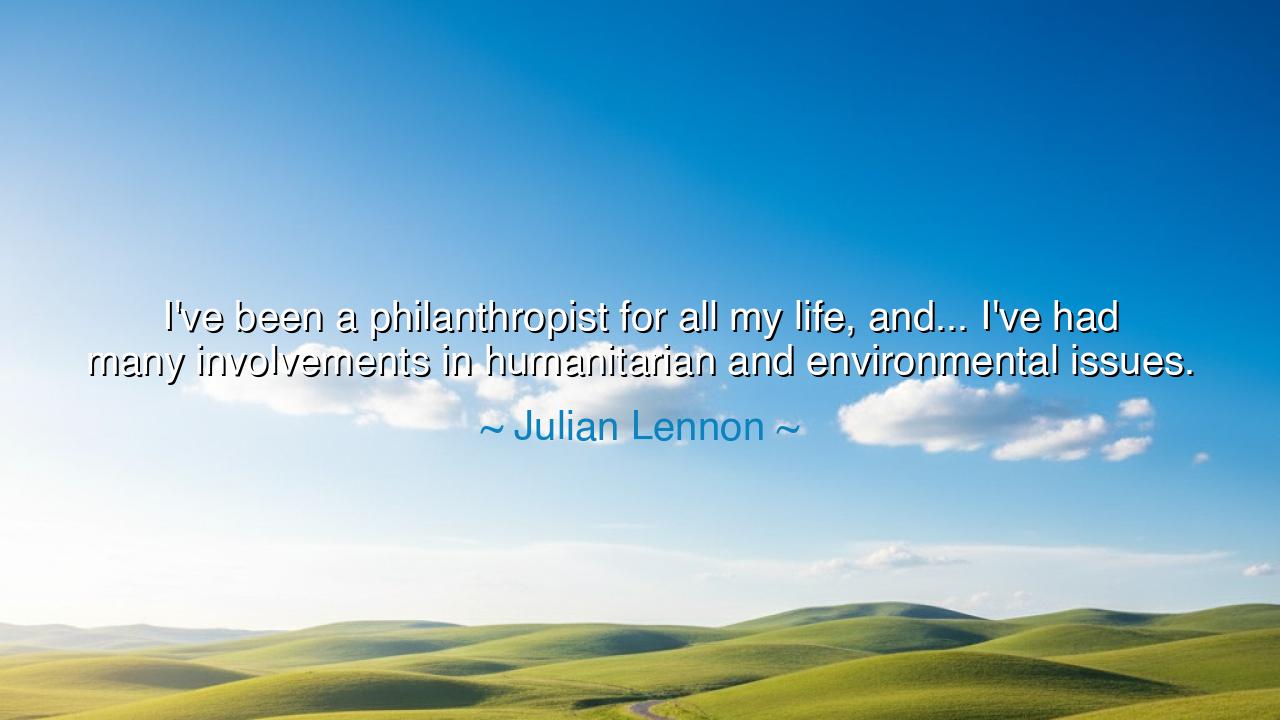
I've been a philanthropist for all my life, and... I've had many
I've been a philanthropist for all my life, and... I've had many involvements in humanitarian and environmental issues.






Hear the heartfelt words of Julian Lennon, son of song yet speaker of his own truth: “I’ve been a philanthropist for all my life, and... I’ve had many involvements in humanitarian and environmental issues.” At first they sound simple, almost modest, yet within them lies a declaration of identity, a life lived in service to something greater than the self. For to call oneself a philanthropist is not merely to give wealth, but to give heart and time, to weave one’s life into the fabric of compassion.
The meaning of his words rests in the ancient bond between man and duty. To act in humanitarian service is to place human dignity above self-interest. To work for environmental causes is to honor the earth as the mother of all life. Julian Lennon, shaped by the weight of legacy and by the voice of conscience, names these not as passing gestures, but as lifelong commitments. Thus, he reminds us that true generosity is not an event but a vocation, a path walked again and again through every season of life.
History shines with examples of such devotion. Consider Florence Nightingale, who in the grim tents of war refused to abandon the wounded. Though she could have chosen a life of comfort, she bound her existence to the care of the suffering. In her footsteps rose the modern nursing profession, a testament that one woman’s humanitarian spirit could ripple across centuries. Like Nightingale, Lennon’s words echo the call to a life that turns from comfort toward service, from self toward the many.
And in the realm of the environment, let us remember Wangari Maathai of Kenya. With her own hands, she planted trees in a land stripped bare, and from that act grew a movement that restored millions of trees and empowered countless women. Her Green Belt Movement was not mere planting, but an act of resistance against destruction, a defense of the earth’s future. Lennon’s reminder that he has walked in such paths of environmental concern places him in the tradition of those who see the earth as a sacred trust, not a possession to be squandered.
The power of Lennon’s words also lies in their humility. He does not claim to have solved the world’s crises, but simply to have been “involved.” And therein lies wisdom: for no single hand can carry the burdens of humanity or heal the wounds of the earth, but many hands, joined in labor, can. His statement teaches that what matters is not perfection or grandeur, but constancy—the willingness to act again and again for the sake of others and for the sake of creation.
The lesson for us is plain: do not wait for greatness before acting. Begin with small acts of philanthropy. Aid a neighbor, feed the hungry, teach the child, plant the tree. Align yourself with humanitarian and environmental causes, for these are the twin pillars of a world that endures—care for each other, care for the earth. Even if your gift is modest, when joined with the gifts of others, it grows mighty, like drops of water forming rivers that shape the land.
Therefore, let each one live as Julian Lennon declares—not as a philanthropist in name only, but in deed, in habit, in daily action. Let your life itself become your offering, your wealth measured not in coins but in compassion. For in serving humanity, you preserve its soul, and in serving the earth, you safeguard its future. This is the path of the ancients, the duty of the present, and the gift to generations yet to come.
So remember Lennon’s words: “I’ve been a philanthropist for all my life.” Let them remind you that service is not a season but a lifetime, not a performance but a calling. And when your days are counted, may they say of you, too, that you walked among the people as a healer, among the earth as a guardian, and among the generations as one who gave more than you took.






AAdministratorAdministrator
Welcome, honored guests. Please leave a comment, we will respond soon